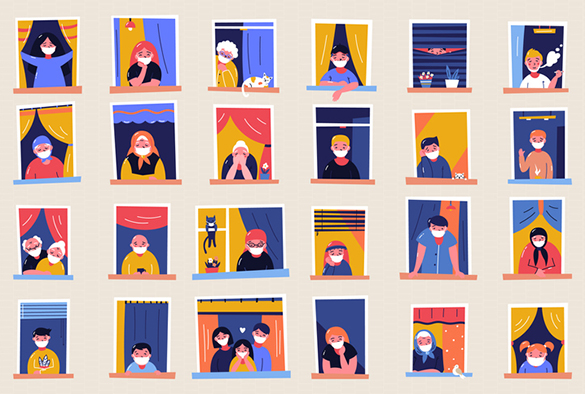
The University of Liverpool is partner in a £500,000 AHRC project seeking to understand the significance of the home during the Covid-19 pandemic.
Professor Georgina Endfield, an expert in Environmental History, and Dr Kathy Burrell, a Reader in Human Geography, will join forces with academics at Queen Mary University London (QMUL) and Birkbeck University, as well as National Museums Liverpool and The Museum of the Home, for the project, 'Stay Home': Rethinking the domestic during the Covid-19 pandemic.
Dr Endfield said: "I am thrilled to be working on this exciting new project and with such a strong team.
"Dr Burrell and I will be focusing on children's mapping of home during the Covid-19 crisis, working with the Royal Geographical Society (with the Institute of British Geographers) and National Museums Liverpool."
Dr Burrell will lead Liverpool's work investigating the changing practices, spaces and meanings of home for migrant, diaspora communities and different faith groups, she said: "I'm really looking forward to getting started and hearing people's stories, and to understanding what home has meant during the pandemic."
The significance of home in the Covid-19 crisis has been far-reaching and profound. As a site of self-isolation and lockdown, the home has been at the forefront of strategies to save lives in the Covid-19 pandemic.
The research will document and analyse the way in which 'home' has been mobilised, experienced and imagined during and after the lockdown. It will explore experiences and understandings related to the national directive to 'stay home' and provide new knowledge about practices and meanings of home.
Based in London and Liverpool, the project will combine a nationwide and city-scale approach in several interconnected strands. Key areas of work include the analysis of material in the 'Stay home' collection at the Museum of the Home, as well as an examination of the practices and meanings of home for migrants, diaspora communities and people of faith in London and Liverpool, both 'hotspots' of Covid-19.
Working with people from different ethnicities, faiths and generations, alongside migrant and diaspora and interfaith organisations, the researchers will create short films, podcasts and various materials for The Museum of Home as well as policy briefs and an interfaith toolkit.
Vanessa Meade, Curator: Exhibitions and Interpretation at The Museum of the Home, said: "We are delighted to be working with Queen Mary, University of Liverpool, National Museums Liverpool and the Royal Geographical Society (with IBG) on this project.
"During lockdown we launched the Stay Home national collecting project, documenting how home lives were changed during the coronavirus pandemic.
"This partnership is an exciting opportunity for us to explore and showcase this collection in new ways, at a time when our homes are more important than ever."
The research will also chart home as a site of (dis)connection on domestic, national and transnational scales. Recognising the impact of school closures and home-schooling, the research will work with the RGS-IBG to lead a nationwide project for children and young people to map their home-spaces.
A city-scale project in Liverpool City Region, in partnership with National Museums Liverpool, will analyse children's narratives alongside their maps. The project will develop a virtual exhibition and learning resources for teachers, children and young people to make sense of the crisis.






